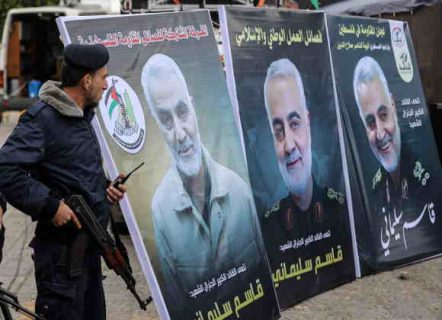The Coming Confrontation

Soleimani’s funeral shows the Iranian leadership is preparing for a fight
The US has placed all its forces in the Middle East on maximum alert, sent nine giant B-52 bombers to Diego Garcia in the Indian Ocean and tightened security at its bases and embassies worldwide, while all the mediators it has sent to Tehran to appeal for restraint have failed. This is a climate of war, not of bracing for one-off strikes whose impact can be contained, enabling things to revert to how they were before the assassination of Qods Force commander Gen. Qasem Soleimani.
The Iranian leadership also seems minded for war, on more than one front. The funeral arrangements it made for Soleimani show it is not prepared to accept American offers to let it get away with a retaliatory strike or two against Saudi Arabia or the UAE – or maybe the al-Udaid airbase in Qatar. The fallen commander’s coffin was carried through the streets of a number of Iranian cities in succession, with millions of mourners turning out to honour him, before being laid to rest. This has never been done before, not even after the death of the Islamic Republic’s founder Ayatollah Khomeini.
In Iraq, after parliament decided to expel US forces, the leaders of all the Hashd ash-Shaabi (Popular Mobilization) factions held an emergency meeting and resolved to unify ranks and launch a campaign of resistance should the US drag its feet or fail to comply with the decision. Their longstanding opponent, Muqtada al-Sadr, not only supported them but joined them: he announced he was re-forming his Mahdi Army and establishing resistance battalions to fight against US troops and force them to beat a humiliating retreat out of Iraq.
The battle it is no longer about breaking the siege and ending the sanctions but redeeming national honour. That is why all the would-be mediators were shown the door, notably the Arab allies of the US who want to spare themselves the impending retaliation even more than their American masters do.
The confrontation is coming, and it stands to change the face of the Middle East. New power-balances will be established, and the US will not be able to retain the upper hand. The Iranian people who turned out in their millions to bury their fallen hero will not settle for half-measures nor hesitate to stand behind their country’s armed forces if it is subjected to aggression. Iran could even emerge in the end as a nuclear-armed power, having suspended compliance with the JCPOA agreement that it faithfully adhered to even after it was ditched by the US (a move it must have been anticipating for the month if not years).
President Trump made the mistake of his life by walking into the trap the Israelis have been luring him towards, and by putting his and Benjamin Netanyahu’s electoral interests above those of his country. He is liable to pay dearly for it, while Iran has little more to lose than the shackles of the embargo.
Trump also humiliated his European and NATO allies, not even informing them of his intentions, let alone his Arab clients who he extorts and treats as cash-dispensers. It would not be surprising if his actions end up triggering a global economic crisis and financial meltdown too, with markets already in jitters at the prospect of another Gulf showdown and the closure of the Strait of Hormuz. Rather than covering himself in glory, Trump may be remembered as the president who brought the era of US hegemony in the Middle East to a close.
 TheAltWorld
TheAltWorld 
0 thoughts on “The Coming Confrontation”